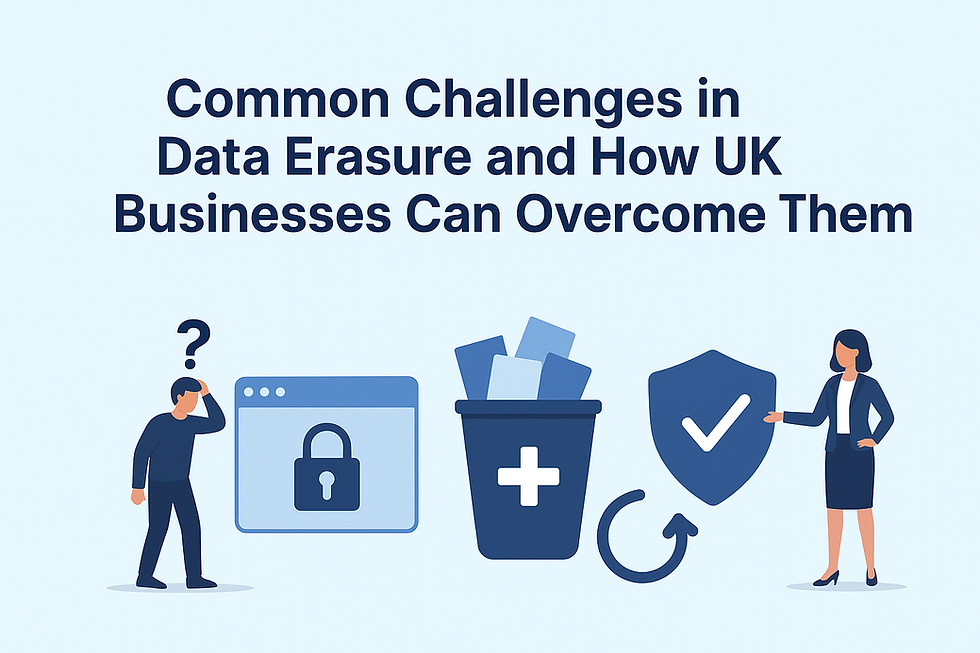The Future of Computer Recycling London: Trends to Watch
- computerwasterecyc
- Oct 24, 2025
- 3 min read
In the fast-paced world of technology, new devices are constantly replacing old ones. While this rapid evolution fuels innovation, it also creates a major challenge, the growing volume of electronic waste. As London continues to lead the UK in technological advancement, computer recycling has become a critical part of the city’s push toward sustainability and data security.
The future of computer recycling in London looks promising, with new trends and technologies reshaping how businesses and individuals handle their outdated IT equipment. From eco-friendly practices to advanced data protection methods, the industry is evolving to meet the needs of a digital and environmentally conscious world.

1. The Rise of the Circular Economy
One of the biggest trends influencing computer recycling in London is the move toward a circular economy, a model focused on reusing, repairing, and recycling materials to extend their life cycle. Instead of viewing old computers as waste, recycling services now see them as valuable resources.
By recovering metals, plastics, and other components, the recycling process minimizes the need for raw material extraction, reducing environmental impact. In the coming years, more London-based businesses are expected to adopt circular economy practices, making sustainability a standard rather than an option.
2. Increased Focus on Data Security
As digital transformation accelerates, data security is becoming an integral part of IT asset disposal. Businesses can no longer afford to overlook the sensitive information stored on old computers and hard drives. The future of computer recycling will rely heavily on secure data destruction processes that ensure complete confidentiality.
Recycling providers are integrating advanced data sanitization methods — including degaussing, shredding, and certified data wiping — to meet the growing demand for secure disposal. These measures not only protect business data but also align with GDPR and other privacy regulations.
3. Integration of IT Asset Management and Compliance
Future-focused recycling solutions are no longer limited to waste disposal. Many companies are combining computer recycling with broader IT asset management and compliance services. This includes detailed asset tracking, environmental reporting, and certification of recycling.
The inclusion of IT audit services in recycling programs helps businesses maintain complete visibility over their equipment lifecycle. From acquisition to end-of-life disposal, these audits ensure that every device is accounted for and disposed of in compliance with environmental and data security regulations.
4. Smart Recycling Technologies
Innovation is revolutionizing the recycling process itself. Artificial intelligence (AI) and automation are increasingly being used to improve sorting accuracy and efficiency. Smart recycling systems can identify materials within electronic waste, making the recycling process faster and more precise.
This technological shift will help reduce human error and maximize material recovery, ensuring more efficient and sustainable computer recycling practices across London. In the near future, expect to see AI-powered recycling centers and automated facilities becoming a standard part of the industry.
5. Growing Corporate Responsibility and Green Policies
Sustainability has become a business priority. London-based companies are adopting greener practices not only to comply with regulations but also to strengthen their brand reputation. Choosing certified recycling partners demonstrates a commitment to both data protection and environmental stewardship.
Organizations like Computer Waste London are leading this transformation by offering eco-friendly and compliant recycling solutions. Their services combine secure data handling with environmentally responsible disposal, helping businesses achieve both sustainability and security goals seamlessly.
6. Collaboration Between Businesses and Recyclers
As awareness about e-waste grows, collaboration between organizations and recycling providers is expected to increase. Companies are forming long-term partnerships with professional recyclers to ensure consistent, transparent, and traceable disposal of IT assets.
Working with certified providers such as Computer Waste London ensures full accountability throughout the process, from collection and data destruction to recycling and certification. This level of partnership not only streamlines operations but also supports long-term sustainability targets.
Conclusion
The future of computer recycling in London is being shaped by innovation, regulation, and responsibility. With smarter technologies, enhanced data protection, and a growing focus on sustainability, the city is setting an example for eco-friendly IT disposal worldwide.
Businesses that adapt to these trends will not only reduce their environmental impact but also strengthen their reputation for security and compliance. Partnering with trusted recycling experts ensures that your organization remains future-ready, protecting both your data and the planet.







Comments